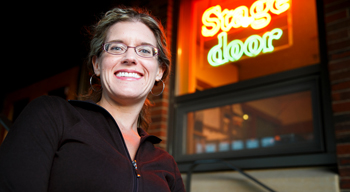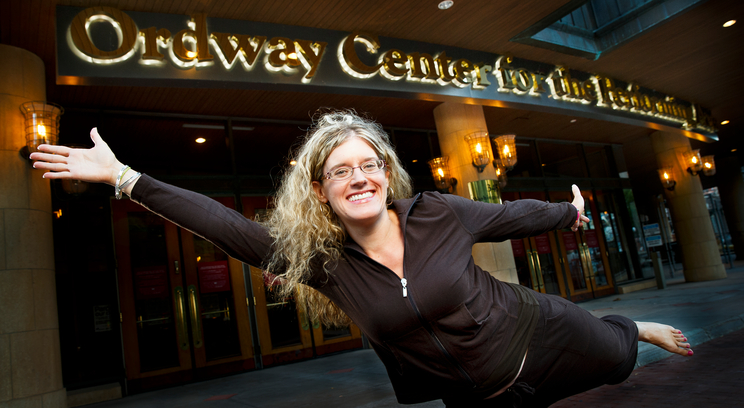“Hey, let’s put on a show!”
Taking a cue from Mickey Rooney in the 1939 film "Babes in Arms," in which he starred with Judy Garland, whenever there's an orphanage to save from demolition or a farm to save from foreclosure, would-be show producers hear Mickey's determined cry ring out and echo with poetic license to this day: "Hey, let's put on a show!"
The idea at the heart of this famous quote has inspired countless stage productions and films. Sounds simple enough – round up the talent, write a show and raise the curtain; ironically, Rooney never uttered those exact, simple words in what has become, nevertheless, an iconic line, and putting on a show is not that simple, either. In fact, it’s downright daunting.
Long before the curtain rises, and long after the standing ovations end and the talent has left the building, someone has been working behind the scenes to bring it all together and to keep it all together. At the Ordway Center for the Performing Arts in St. Paul, one of the nation’s premier regional theaters, that behind-the-scenes person is Renee Prola ’96, the Ordway’s company manager.
Accounting and speech-communication
A December 1996 graduate of St. Thomas, Prola, who hails from Northeast Minneapolis, was hired by the Ordway in July 1997 as an accountant after double-majoring in accounting and speech-communication. It was her first job following graduation.
“I had been to the Ordway to see a few different shows. I can’t say that, ‘Oh, gosh, I want to work in a theater – I have to apply for this job,’” Prola said in a recent interview, “but I was familiar with the Ordway and I knew its reputation in the community. I felt like I had applied for just about every other accounting job since I had graduated so I applied for this one, too.”
She remembers the day she interviewed; the first touring production of “Rent” was playing; campers had circled the building for rush tickets. Prola was hired the next day.
Speech-communication may seem an unlikely choice for a double major with accounting, especially for someone who was not involved in theater in high school or college. But what better preparation to work in theater?
While the actors, singers, dancers and musicians receive all the public acclaim, it's the accountant who keeps the company on track financially, articulating and explaining to its various departments what she needs to ensure that the bills get paid so that the curtain can keep rising.
“It really is a perfect fit. I remember when I was going to school at St. Thomas I had a few people ask me: ‘If you are doing accounting, why aren’t you doing a finance double major or an econ double major?' And I’d say, 'Well, no matter what I do with accounting, if I go into public accounting or government accounting, nonprofit accounting – whatever aspect of accounting I go into – I’m going to have to talk to people.’”
Enter James A. Rocco
One of the people she talked to was James A. Rocco. In 2006, with the Ordway looking to get back into producing shows after a short hiatus, Rocco was hired as vice president of programming and producing artistic director. Prola was still in the Accounting Department; occasionally, their paths would cross and Rocco often would ask her budgetary questions.
Their interactions became more formal after a senior staff member volunteered Prola to help Rocco when he would be out on a show-scouting trip.
“I know he was like, ‘Oh my goodness, an accountant is going to help me?’” Prola said, laughing. “He said, ‘OK, sure.’ He just needed a few things and I did those for him. When he got back I would check with him because he was a department of one. He needed to know where check requests were, if his budget was in line, that day-to-day aspect that I knew about, because a lot of it either came to or originated in the Accounting Department. I had a fairly good idea of a number of things that he was looking for. I could just quickly answer the questions for him, and I would pop in his office a few times a day to make sure everything was going OK. We really hit it off.”
The following season the Ordway produced four shows, two in the 1,900-seat Ordway Music Theater and two in the 306-seat Ordway McKnight Theatre. Rocco knew he couldn't do it alone. He needed help, and the Ordway posted for a company manager. Prola applied and got the job.
Company manager
Prola’s responsibilities as company manager include working with all of the Ordway’s internal departments on both the financial side and the people side of theater – covering just about everything it takes to put on and maintain a show except the actual singing and dancing. There is never a typical day; no two are the same.
It’s a fun job, it’s a lot of fun. I have said on many occasions that I probably have one of the best jobs in the world.
For an Ordway self-produced show, on the people side of the ledger, on any given day she might:
- Coordinate travel packages and rental cars
- Arrange for apartments or other accommodations (e.g., Two bedrooms or one? With family? With pets?)
- Provide scripts and scores for rehearsals
- Pick up directors and actors at the airport
- Answer questions (e.g., How far to the rehearsal space from the theater? How long in rehearsal space? When do rehearsals move to the theater? What about parking?)
- Recommend ear, nose and throat specialists
- Arrange for tickets for family members of the cast
- Coordinate the occasional wedding proposal request
- Facilitate meet-and-greets with board members and donors
“In a nutshell, basically, when you boil it down, it’s making sure that people are happy,” Prola remarked. And not to be overlooked – the financial side of putting on a show:
- Payroll
- Financial reports to accounting and various unions
- Tracking budgets
- Writing contracts
“If you’re not really watching what they’re dreaming of – you may have to rein them in, or say, ‘Yes, you can have more rose petals’ or, ‘No, you can’t have more pyrotechnics.’ You have to watch it,” Prola said. If she has to say “no,” it’s important to explain why the suggestion or proposal won’t work, which is where communication skills come in especially handy.

You can enter the Ordway Center for the Performing Arts through this stage door, or the front door with a ticket, and sometimes with a double-major degree in accounting and speech-communication, as Renee Prola ’96 did 16 years ago. (Photo by Mark Brown)
The biggest challenge, however, Prola notes, is “probably staying on top of everybody’s needs and wants and making sure that it all makes sense and fits. And making sure that everybody has all of the information. Making sure that I’m sharing schedules with the right people.”
Touring shows
When the Ordway hosts touring shows her role tends to be more of a resource for the area.
“A touring show like 'Buddy' is going to be a little bit different because a touring show will travel with one company manager and possibly one or two assistant company managers, and the shows are very self-sufficient,” Prola said. “They may have some questions about restaurant recommendations or things to do outside of the showtime, or what chiropractor would I recommend.”
A curtain falls, but the show must go on
The Ordway is undergoing an expansion that will add the Concert Hall to the existing Ordway Music Theater, but in the process the Ordway McKnight Theatre will fade to black. Prola will miss the McKnight. It holds dear memories.
“The McKnight holds a very special place for me because it was the first venue that I ever did a show in. I helped out on ‘Love, Janis.’ I was still in the Accounting Department. … And then when we did the 'Rocky Horror Show' that fall I was the company manager, and that was my first actual show – in that space,” Prola recalled. "I’m excited for the Concert Hall. It’s going to be a beautiful concert hall, and I’m excited for the possibilities not only for the St. Paul Chamber Orchestra, the Schubert Club and the Minnesota Opera but also for what we can bring to it, and just having a new space. … But the McKnight will always be very special.”
The show must go on, however, even without the McKnight Theatre. For 16 years Prola has had “the amazing fortune to work with wonderfully talented people,” and she's excited about the Ordway's next season. She'll be there to ensure that "it all makes sense and fits" when someone cries out: “Hey, let’s put on a show!”







